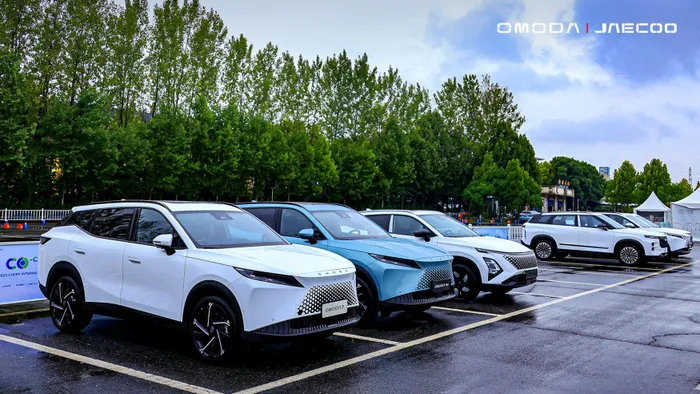
The Omoda 7 was launched in South Africa this month. Several leading Chinese automakers have already initiated feasibility studies to explore establishing assembly plants in the country.
Image: Supplied
Banele Ginindza
Government’s anticipated revision and recalibration of the Automotive Production and Development Programme (APDP) is expected to open the door for major Chinese original equipment manufacturers (OEMs) to scale up New Energy Vehicle (NEV) production in South Africa.
According to Standard Bank, an enhanced policy framework has potential to position the country as a strategic production and export hub for next-generation mobility, particularly for the European market.
The drawcard lies in South Africa’s duty-free access to Europe, with the potential for increased exports, economic growth and deeper regional industrial cooperation.
Several leading Chinese automakers have already initiated feasibility studies to explore establishing assembly plants in the country. While no firm commitments have been announced, the level of activity indicates strong intent.
Brands such as Chery, GWM and BAIC have cemented their presence in the South African market, gaining popularity through affordability, improving quality and modern design.
Their rise comes as South Africa’s traditional automotive manufacturing sector grapples with rising production costs, shifting global trade dynamics and lingering policy uncertainty.
Standard Bank Executive Vice President for Corporate and Investment Banking, Client Coverage, Lydia Zhang, said the bank has supported the growing interest from Chinese OEMs through its long-standing partnership with the Industrial and Commercial Bank of China (ICBC) and its dedicated China segment.
“While we would expect Chinese OEMs to begin with semi-knocked down (Semi Knocked Down) or limited-scale assembly, it is important that this evolves into full-scale CKD (Completely Knocked Down) production within a defined timeframe,” Zhang said.
“We see this progression as critical for job creation and meaningful local industry participation, supported by South Africa’s automotive supplier base. Government policy should reinforce this trajectory, ensuring accountability and tangible local economic impact.”
Zhang said from the bank’s perspective, the market is receptive to more local investment, and consumers have seen the value of Chinese brands offering comparable products, at competitive price points.
"It would be greatly encouraging, and further support the local automotive sector, to see more Chinese OEMs invest in South Africa, establish significant manufacturing capability in the country to serve the wider continent’s growing demand," Zhang noted.
The Department of Trade Industry and Competition (the dtic) over the weekend confirmed South Africa was using its hosting of the G20 Leaders' Summit to push for deeper partnerships on clean industrialisation, energy transition, and the rapid scaling-up of electric vehicle (EV) production.
The dtic has said it is eyeing greater penetration into the African EV market, which Ali described as a major untapped opportunity.
Speaking on the sidelines of the G20 Leaders' Summit, the dtic spokesperson Kaamil Ali said Pretoria is prioritising trade and industrial development within the G20 agenda, with a specific focus on ensuring that African countries benefit from the global shift toward green technologies.
Responding to questions about South Africa’s long-awaited EV policy, Ali confirmed that the policy paper has been adopted, with a March 2026 rollout date. He said the dtic and the National Treasury are finalising a new incentive framework to accelerate EV manufacturing locally.
Ali added that the EV transition is tightly linked to the country’s energy and industrialisation pillars under its G20 theme of sustainability.
"Linked to that is the pillar of sustainability within our G20 theme that we've adopted. And linked to that is our industrial policy pillar, which focuses on decarbonization. So we are committed to that date where we'll be creating an incentive scheme between us and the National Treasury around electric vehicles," he said.
"But also linked to that will be obviously the energy inputs into those electric vehicles, component manufacturing into electric vehicles. So we are talking to a number of players around the world, including the Europeans, on how we can accelerate that work."
Meanwhile, Zhang noted that the growing interest from Chinese automakers comes at a time when some traditional manufacturers are scaling back operations or relocating production outside South Africa, creating a potential void for new entrants, particularly those supported by government incentives and improved infrastructure.
Zhang said the by Chinese OEMs comes as traditional manufacturers are reportedly scaling back their operations or relocating production outside of South Africa, creating a vacuum that new entrants could fill, especially if they are supported by government incentives and infrastructure development.
However, she cautioned that several obstacles remain. Energy constraints, logistics bottlenecks, tariff clarity, labour regulations and long-term policy certainty are all key considerations for prospective investors.
"Investors will also be looking for clarity around tariffs, labour laws, and long-term policy commitments. Brand perception is another consideration," she said.
"While Chinese vehicles are gaining acceptance, some consumers still benchmark them against their European and US rivals. Continued investment in quality, after-sales service, enhancing the used vehicle value retention and marketing will be essential to shift any perception gaps."
BUSINESS REPORT